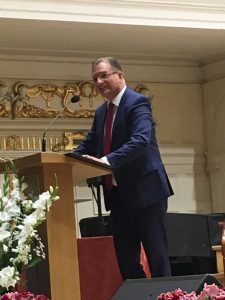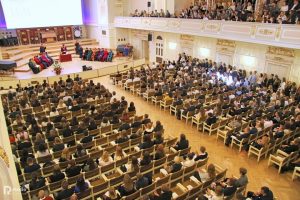On October 1, 2019, Prof. Marek Kwiek gave an Inauguration Lecture in the AMU Hall on the occasion of the opening of the new Doctoral School at Adam Mickiewicz University (it will host, by 2022, 500-600 doctoral students).
The lecture was entitled: “Global science: why it is based on inequalities (and what this implies for young scientists)”.
Selected themes from the Lecture:
“I will tell you about the logic of global science. About what drives it – and why it is immanently connected with inequality.
The lecture is addressed to future young scientists – at the beginning of their careers. It starts now, not in 4 years after the doctoral thesis.
Every year of scientific work matters: because the achievements (here: young people) are cumulative! It adds up!
In four years’ time scientific “I check” will appear: and in the best universities, such as Adam Mickiewicz University – one thing will count: chances for the author of works published in the best journals (or the works themselves! Rather written together with the PhD advisor).
I guarantee you that in the end, only this will count. And that’s it, especially if Adam Mickiewicz University becomes a so-called Research University.
Additionally, you will count on science grants (but only through publications) – and international contacts or international internships (but only in good places).
In a word on a blank page, only these publications will be important (and two measures subordinate to science: prestigious financing and prestigious internationalisation).
And nothing else. Nothing. (The following will not count: usefulness for classes; organizational activity; numerous national conferences; student self-governance, etc.)
What’s more: the same page can be the key to a global career in science. Because the rules in Poland are becoming global.
And I will tell you about it.
The whole world uses the same boring, countable and comparable measure of scientific success: the best publications. Not all of them – only in prestigious journals.
This is the Bible for you; this is the message of this lecture.
My task today is to show briefly what rules of the game apply in science – and why this is the case.
When I say ‘science’, I am talking about basic sciences in the university sector. To a certain extent, some social sciences (law, economics, pedagogy); and almost never humanities.
(Humanities are largely governed by its own laws and traditions. This is national history, national literature, Polish publications, Polish as the language of science – and Polish scientific readers.
In Western countries it is a percentage margin of university science: 10% of professorship, 10% of research funding. In Poland, it plays a large role – because it traditionally did not require any investment.)
**
So I’m going to talk about global science – one, common, practiced in English. A powerful scientific library of humanity. The global scientific conversation of the community.
Global science is stronger than ever before – stronger than international science, supported by nation states; and stronger than local science, practiced in local languages, for local needs.
***
However, today science inequalities are becoming stronger than ever before. My area is Sociology of Science (and Sociology of Academic Careers)
Never before have the divisions in science been so clear.
Science is born from extreme, systemic inequality: talent, achievement, diligence – but also coincidence.
Science has a skewed distribution of Vilfred Pareto and Alfred Lotka – not a normal distribution of Carl Friedrich Gauss.
Science has a distorted distribution of both publications and quotations.
In my works I diagnosed the 10/50 rule (10% of scientists are responsible for half of publications – in 11 European countries. And in Poland).
Why is it important today? Transparency and measurability.
Only recently has science been almost transparent: at the level of individuals, research teams, faculties, disciplines, universities and, finally, entire national systems of science.
From the perspective of a young scientist, two types of social stratification in science are the most important. They are linked by research, a fundamental activity for the university sector in Europe. These are:
(1) Stratification according to scientific productivity.
(2) Stratification by internationalisation of research.
However, there are other types of stratification in science:
(3) stratification according to academic power: according to the place they occupy (most often in the division between “younger” and “older”, and in the Polish context – “dependent” and “independent” scientists).
(4) stratification by age: by age cohort.
(5) stratification by academic role: by role (especially research or teaching)
(6) stratification by access to research funding: in terms of chances of competitive research funding.
(7) stratification by journal: in line with the prestige of the journal in which they publish. And
(8) gender stratification: according to gender, intersecting all the above types of social stratification in science.
The global academic community is therefore powerfully divided.
A key factor in this new stratification of the scientific community is research.
Nothing divides scientists as powerfully as research today.
On the one hand: Fully global science is the science of scientists open to international cooperation, joining more and more often into international research teams.
But on the other hand: Global science, however, is also the science of growing divisions – based on competition for research results and the fight for global academic recognition.
Nature, Science, Cell or Lancet (and on the financing side of the European Research Council (ERC) in Europe) is a separate scientific league.
Never before have the most talented young people had such global opportunities to function in science.
At the same time, however, a little less talented young staff has never functioned in such difficult conditions created by growing competition.
Social stratification in science is an internal process, not an external process to the academic profession – because it refers directly to scientists, not only to the institutions employing them.
For scientists, especially in basic sciences, prestige, success and recognition are inherent in important research published in globally read journals.
The motive of priority of discovery attributed to an individual or a group of scientists is as strong as ever.
Science rewards – but only for first place!
Science is a powerful academic game (there are winners and losers).
Science is not democratic and it is not egalitarian.
Science is ruthless competition for recognition (and resources).
All in all: Science is inequality.
The Holy Grail of Scientists is time (for research)! Nothing is a more valuable resource! It cannot be recovered; it cannot be bought back….
Today you have an incredible amount of it. There will be less and less of it in your life…
Therefore, everything that is crucial in science, but only auxiliary, is worth doing today (English; graphic programs; databases; programming languages, etc.).
To sum up, science is driven by:
(1) the search for prestige,
(2) merciless international competition; and
(3) evolving recognition distribution systems.
However, the power of science is the power of individual scientists.
There is always a scientist at the heart of academic science! (Clinton: It’s the individual scientist, stupid!)
***
Generally speaking, the era of comparative data is coming.
The biggest shock for the academic community is the entry into the science management policy of international comparative data. Hard data.
Mainly thanks to the OECD and Eurostat. Then the Web about Science and Scopus. That is, the entry of bibliometric data at the same time.
The belief in the high quality of available data gave rise to international university rankings (headed by the Shanghai ranking). The hierarchy of journals within different fields of study has been strengthened.
Surprisingly – and this is what my history of global science is about – the world of science has become measurable. And all scientific achievements are visible.
As always, I stress: today we know everything about everything – countries, institutions, faculties, disciplines or research groups.
For Poland – for Adam Mickiewicz University – it is a huge burden. We are completely exposed.
We measure and evaluate science quantitatively – although with a strong expert element (peer review).
Ubiquitous measurement is a common method of distributing increasingly insufficient resources for research in the Western world:
– with a growing number of scientists,
– with a growing number of research areas,
– and the rising – even infinite – costs of science.
The financial appetites of science and scientists are unrestrained – according to the logic of science development.
And the capabilities of the states are finished and strongly limited nowadays.
Academic science costs hundreds of billions of euros in the Western world today.
In the new conditions, it is difficult to find not only the Polish but also the entire European academic profession.
***
There is a strong dispute between the local and the global in science.
The tension between what is local and what is global relates to the way science is understood and to established publishing patterns.
For local learning, the language of science is Polish – which effectively cuts it off from world science, from international cooperation, from global prestige.
Thus, it cuts off from global (or European) funds for research (ERC type).
Discussions about why basic sciences are only global – and only as global they are financially viable – the West went through 3 decades ago.
Just like it went through discussions about the language of global science, that is English! We cannot be archaic – and yet we are still….
For the younger generation – you! – it is unforgivable.
***
The mechanisms are as follows (and this is worth remembering):
At each stage of their careers, different scientists take on different academic roles (education, research, management, working for universities, etc.) and spend their working time in different ways – but they are evaluated only from one angle.
This angle means successes in science (publications, quotations, external financing and awards).
Success gives rise to success, and initially small differences lead to a deep diversity of academic staff over time.
Lack of success gives rise to lack of success – just as advantages accumulate, so do scientific losses…
The rich get richer and the poor get poorer – at a disproportionate rate… (Merton).
The more importance we attach to knowledge production in the form of publications in indexed journals (in global databases) – the deeper the stratification according to scientific productivity will be.
This is due, on the one hand, to the widespread availability of bibliometric data and, on the other hand, to the readiness to use them at the same time as overcoming subsequent stages of scientific career and competition for funds for research.
As the principles governing academic prestige throughout the continent become homogenized, the evaluation of a single scientist on the basis of international, universally recognized breakthrough publications becomes more and more important.
Young scientists should increasingly understand that European academic institutions have, in principle, the same measures at their disposal. And that is exactly how it will be in Poland.
And all measures of evaluation are based on research: publications, quotations, awards and external financing.
Why? Because the institutions compete for:
– public funds,
– positions in international rankings, and
– to hire the best scientists.
Collective institutional success – depends on the sum of individual research successes of employed scientists.
Universities maximize prestige – not profits (prestige-maximizers, not profit-maximizers).
And it is publications and competitive research funding that increasingly determine the level of funding for entire institutions and their departments.
This is more and more a Polish case! (“Research universities”; categories of “Commission for the Evaluation of Science”, etc.).
Employing scientists with numerous very good publications generates funds for research;
Conversely, hiring scientists who publish little and insignificant journals restricts access to funds for research – directly and indirectly.
As a result, the tensions to which researchers are subjected in their daily work are increasing.
Changes on the abstract macro-level have powerful consequences on the individual micro-level of the academic staff. The level of us, scientists.
***
What to do, young people ask? Three clues:
(1) Awareness of what is important in the context of competition in a globalising science (publications… and publications!) is useful.
(2) It is worthwhile to plan in detail the stages of a research career in terms of research (and no other) achievements.
Transparency of scientific achievements makes it easier for the best to advance – but prevents the less productive from being promoted.
(especially in the situation of tens of thousands of postdocs in Europe, who are changing countries and looking for permanent employment).
(3) Choosing an academic workplace has important long-term consequences. The status of its university as a workplace is increasingly determining life chances (including the possible distribution of working time). At the forefront, with a valuable pool of time potentially devoted to research. Science can only be cultivated effectively in selected places!
***
From the early post-war years, the world’s conviction that the development of science is based on the search for recognition by scientists – preferably in the conditions of constant, merciless competition – has been consolidated.
Competition for the most talented minds, the best working conditions and the most widely known publications.
Older generations of the Polish staff can easily abstract from the idea of science competitiveness.
However, the young staff competes with their colleagues from their institutes (and with colleagues from Western institutes):
– for a limited place in the best scientific journals,
– national and international research funds,
– for postdock positions at the best Western science centres
– and many other signs of scientific prestige.
The young generation has no right to believe in the sensibility of local, Polish science (for their own good and in order to increase their chances of survival in the globalizing science).
The young generation has no right to believe that it will be able to do so:
– publish research results in uncompetitive, unread (and insignificant for the development of science) local scientific circulation;
– remain on the margins of discussions that take place in the circulation of Western magazines and books;
– conduct scientific research only in Poland and present its results in Poland, within the framework of local, national scientific conferences.
– Publish sporadically and only in Polish.
– to work 35 or 38 hours a week…
Of course, all this will be possible – but in the lower segments of a differentiated system.
It is worth to think about it now, at the beginning of the road…
I wish you a phenomenal 4 years of scientific work! Great publications – defended doctoral theses – and finding your own ways in science (preferably with us, at Adam Mickiewicz University)!
Thank you”





